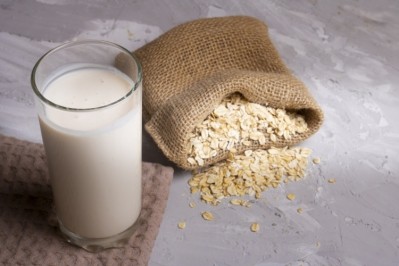DSM squaring the circle of plant-based and animal protein for a ‘holistic food system transformation’

Dutch ingredient supplier DSM describes itself as a ‘purpose-led, science-based’ company that leverages innovation to ‘tackle some of the world’s greatest challenges’.
These include the environmental toll of food production. Last month, the group secured validation from the Science Based Targets Initiative for its ambition to reduce direct greenhouse gas emissions from its operations in line with the 1.5°C target set out in the Paris Agreement.
The company says it has made ‘rapid progress’ on its own emissions in recent years. An initial target to cut total direct emissions from 2016 levels by 30% by 2030 was confirmed in 2019. This was updated to 50% in 2021 and again to 59% in August, with the overriding ambition to reach net zero by 2050 ‘if not sooner’.
While the company is making progress on reducing its own emissions – through efforts like sourcing renewable energy, with a target of 100% renewables by 2030 – it also understands that it plays an important role in the value chain to help transition the food system as a whole towards a more sustainable footing. “We have an important role to play connecting our partners but also because our business is active in nutrition and health,” according to innovation Vice President Elisabeth Hirschbichler.
Speaking at food industry trade show Fi Europe in Paris earlier this month, Hirschbichler explained she believes DMS has an important role to play in sustainable development based on its ‘integrated value chain’, supporting ‘holistic food system transformation’ by helping to ‘integrate stakeholders’.
“The urgency [to act on climate] is high. I believe the industry needs to step up. We need to bring our full innovative power to bear to make it happen. There are some innovative solutions. This is a call for action,” she stressed.
The plant-based trend: ‘It’s here to stay’

Advocates of plant-based diets often highlight the positive impact that reducing our consumption of meat and dairy would have on the planet, with some studies suggesting the adoption of a vegan diet would have a big impact on cutting emissions in the atmosphere. The IPCC, for instance, found a global switch to veganism could cut eight gross tonnes of CO2 from the atmosphere, whereas a “climate carnivore” – someone who cuts red meat by 75% – would cut just over three gross tonnes.
DSM was the official ‘plant-based partner’ of FiE. Hirschbichler shrugged off any concerns about the plant-based sector slowing and insisted ‘next generation plant-based’ is ‘one of the key trends and it’s here to stay’.
Nevertheless, the innovation expert observed, the industry can do more to increase the category’s appeal and ensure consumers get the organoleptic experience they are looking for when they buy into plant-based.
“Food and beverage producers can really step up to make it more exciting,” she told this publication. “If you look at some of the big novel brands, we do see some slowdown but… consumers are still telling us ‘we are flexitarian’. There are some elements that need to become better. As an industry we need to step up to meet consumer demand and expectations.”
This situation presents F&B manufacturers with an opportunity to innovate for better plant-based products by improving their taste, texture and health profile – as well as better communicating sustainability attributes - in order to convert curiosity and hype into structured repeat purchase, Hirschbichler continued. She also sees space for the development of different formats and applications, such as fish, while DMS ‘sees a huge amount of growth’ dairy alternatives.
On health, Hirschbichler stressed: “Nutritional profile is super important. That’s where we as DSM see great opportunity to step in... We see continued and broadening interest in health benefits.” The company has developed a number of solutions it believes can boost the health credentials of plant-based products, such as premixes with minerals, including iron, and vitamins.
There is also scope to explore different types of plant-based protein. For example, DSM has launched CanolaPRO, which delivers a ‘complete amino acid profile', ‘digestibility’ and is free from the major allergens. In terms of functionality, Hirschbichler explained the ingredient offers ‘solubility, mouthfeel and smoothness’.
Another opportunity is combining different sources of plant-based protein, with things like canola and pea for meat alternatives providing good functionality, cost of use and giving a ‘nice value proposition’. Protein diversification, she continued, is an ‘important consideration’ offering benefits on issues like biodiversity.
Reducing the impact of animal-based protein
While DSM wants to support innovation that helps drive the plant-based category, a sizeable proportion of the company’s business lies in animal nutrition. Hirschbichler does not see this combination as contradictory and, indeed, suggests it allows DSM to maximise its impact on food system transformation.
“Consumers are always going to have different preferences. If we can step up on taste and texture in plant-based, some will switch. Some will still want to eat animal-based foods. If that animal-based product is less negatively impactful and the plant-based alternative is more appealing, we can make a big impact. The combination is really interesting. We need to pull all the levers we can to address the environmental crisis we face.”
DSM is leveraging the same science-based approach to sustainable innovation in the animal nutrition space as it does for human nutrition.
Ruminants (mainly cows) emit around 20% of all methane gasses globally, so reducing emissions in ruminant herds will play a vital role in meeting global climate ambitions. In response to this challenge, DSM has developed solutions like methane-reducing feed additive Bovaer.
Bovaer can achieve an average enteric methane reduction of 30% in dairy cows, and 45% in beef cattle (with some tests showing reductions of up to 90%), according to the company. The group recently announced investments to step up production of the product, which is in the early commercialisation phase, at its Dalry site in Scotland.
Through innovation and investment spanning feed and food, DSM is able to deliver ‘end-to-end’ solutions across the value chain, supplying climate smart inputs ranging from animal nutrition to the enzymes used in cheese production.
Indeed, through the use of enzymes, food makers can increase yield and reduce waste while also cutting production time and cutting heat and water use, for an overall lower environmental footprint. For example, Hirschbichler revealed, in the production of oat milk DSM enzymes can be used to combine two production steps into one, enabling a 30% reduction in energy use.
In the current energy environment, with costs surging, the opportunity to lower costs as well as boost the environmental sustainability of operations is proving a compelling argument, the innovation expert revealed. “Consumers and customers are looking at options to reduce cost, asking ‘how do you efficiently and effectively produce food in the current environment?’”
Digitalisation and the need for speed
Hirschbichler believes that the need to cut costs and increase production speed will also drive the uptake of another key trend she sees in the food production space: digitalisation.
“Digital technologies and AI are emerging because we are thinking about cost and speed. The increased use of digital tools and big data is helping us become much faster and more targeted,” she observed.
New digital tools also offer fresh opportunities to innovate and deepen customer relationships through co-creation, data exchange and digital services – facilitating the targeted development of cultures for example. “If you look at where we use digital innovations most effectively it is the R&D process,” Hirschbichler said pointing to biotech developments. New digital tech is also driving operational efficiencies at DSM through tech like digital twins of factories, part of DSM’s DNA programme.
“The business case frankly is compelling. We aren’t doing it because it’s interesting we are doing it because it is compelling and boosts value creation.”
































